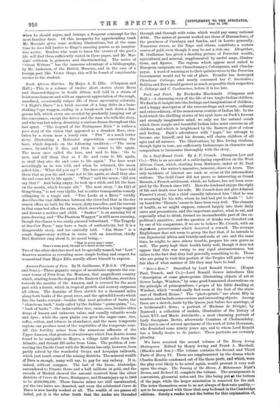and diamond-diggers in South Africa, well told in a strain
of boisterous humour and with an apparent appreciation of the rough, unrefined, occasionally vulgar life of these up-country colonists.
"A Night's Drive" is a brisk account of a long drive in a bone- shaking Cape waggon, ending in a break-neck rush down a dan- gerous hill, which every one avoided by prudently jumping out of the conveyance, except the driver and the man who tells the story, and who was fast asleep, dreaming a curious dream throughout this last spurt. "The Legend of the Portuguese Ruin" is rather a poor story of the vision that appeared to a drunken Boer, over- taken by a storm near a lonely ruin. " Piet " is a much better story, illustrating a Hottentot superstition concerning the hare, which depends on the following tradition :—" The moon comes, by-and-by it dies, and then it comes to life again. The moon once called the hare, and said to him : Go to men, and tell them that as I die and come to life again, so shall they also die and come to life again.' The hare went accordingly as he was told, and when he returned, the moon asked him : What did you say ?' The hare replied : I have told them that as you die and come not to life again, so shall they also die and come not to life again." What !' said the moon ; did you say that?' And being angry, he took up a stick, and hit the hare on the mouth, which became slit." The next story, "An Idyl of Gong-Gong," is not very idyllic, but is rather transpontine comedy collapsing to a tragic end. "Two Looks at a River" vividly describes the vast difference between the river-bed that in the dry season offers no bath for the weary, dirty traveller, and the torrent in that same bed after the rains, which overwhelms a huge waggon and drowns a mother and child. " Snakes " is an amusing bit of yarn-drawing, and "The Phantom Waggon" is still more amusing, though the climax is too easily guessed beforehand. "The Tragedy at Sea-Cow Farm" may have a basis of authenticity, but it is a disagreeable story, and too cynically told. "Jim Stone" is a rough digger-story written in verse, with an American, chiefly Bret Harteish ring about it, its moral being,— " That in every DM'S aster
There's some good, though he's down in the scale."
Two of the other sketches need not be specially named, but "Lost" deserves mention as revealing more simple feeling and respect for womankind than Major Ellis usually allows himself to express.


















































 Previous page
Previous page